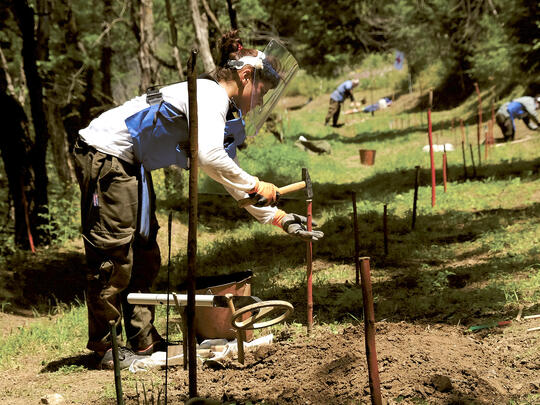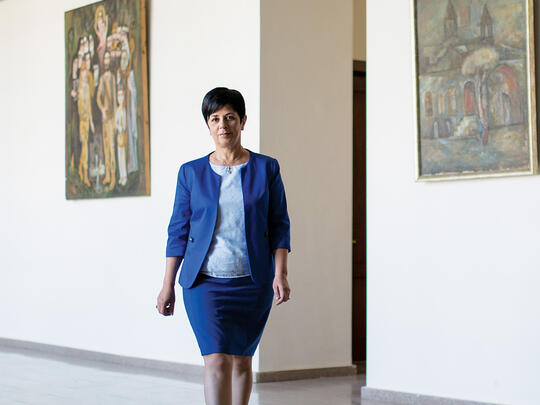At 96 years of age, Paul Ignatius is an active great-grandfather whose memory is as outstanding as his stellar career. A commissioned lieutenant in the U.S. Navy in World War II, Ignatius served for eight years in the presidential administrations of John F. Kennedy and Lyndon B. Johnson, first as assistant secretary of the Army, then as Under Secretary of the Army and Assistant Secretary of Defense, and finally in 1967 as secretary of the Navy. He is the recipient of the Army Distinguished Civilian Service Award, the Navy Distinguished Public Service Award, and the Department of Defense Distinguished Public Service Award.
Born on November 11, 1920, in Glendale, California, Ignatius is the son of Armenian parents who migrated to the United States, Elisa (née Jamgochian) and Hovsep “Joseph” B. Ignatius (original last name—Ignatiosian).
Ignatius received his bachelor's degree from the University of Southern California and his MBA degree from Harvard Business School in Boston, where he founded Harbridge House, Inc., a management consulting and research firm.
Following his government service, Ignatius became president of The Washington Post for two years and president of the Air Transport Association for 15 years. A trustee of the George C. Marshall Foundation and member of the Federal City Council and the Washington Institute of Foreign Affairs, he has also authored two books: On Board: My Life in the Navy, Government, and Business (Naval Institute Press, 2006) and Now I Know in Part: Stories of My Growing Up (Armenian Literary Press, 2000), a vivid memoir recounting his Armenian family history, childhood in Glendale, military service and more.
Currently living in Washington, D.C. with his wife Nancy, Ignatius spends his time serving on the boards of charitable organizations that benefit disadvantaged youth and enjoys visiting family in New England. Among his four children, David Ignatius is an associate editor and columnist for The Washington Post, as well as a novelist; Adi Ignatius is Chief Editor of the Harvard Business Review; Sarah Ignatius is the Executive Director of the National Association for Armenian Studies and Research (NAASR), while Amy Ignatius is a Carroll County Superior Court Judge in New Hampshire. Together there are nine grandchildren and two great grandchildren.
Q On April 8, 2017, your highly distinguished record of public service was recognized by the Navy with a special ceremony to christen the USS Paul Ignatius, the Navy’s newest Arleigh Burke class guided-missile destroyer named in your honor. What did it mean to you to be recognized in this special manner by the Navy?
A I was really surprised and quite overwhelmed when the Secretary of the Navy first told me he would name a destroyer in my honor. But it’s hard for me to express the emotions I experienced this April when the ship was christened. My wife, children and many of our friends attended the wonderful two-day celebration. I was thrilled to be honored and I am very grateful because the Navy meant a lot to me during the war. It was a very important period of development, coming of age and accepting responsibility. During the ceremony my wife Nancy broke the bottle of champagne over the bow of the ship so it was a big thrill.
Q You served as Assistant Secretary of Defense and Secretary of the Navy during a critical and controversial chapter in American history. Looking back today, what do you remember most?
A This was a period where there was a great deal of controversy over the Vietnam War. At home, there was tension in the family as my children and my wife all thought the war was a bad idea. My children wondered how papa could be a good guy but then be involved in the war? They thought the policy of United States at the time was wrong and while I disagreed, I am proud that my children were thinking for themselves. I had colleagues whose family relationships suffered but we survived it.
One experience that I will never forget as Secretary of the Navy, I gave a speech in San Diego and in the audience was a retired Captain of the ship aboard which I served during WWII, a small aircraft carrier, the USS Manila Bay, which came under attack by two planes flown by kamikaze pilots—one plunged through the flight deck and exploded. During my speech, I asked the Captain, Fitzhugh Lee to stand and told the audience what a great man he was, how he had saved our ship through courage and foresight, while the crew put the fires out before they consumed the aviation gas and the ordnance. Well I am sure the last thing he ever imagined was that this young lieutenant he knew would become the Secretary of the Navy one day. It was a great experience for me to acknowledge his leadership and one I particularly treasure.
Q In your memoir Now I Know in Part, you chronicle your Armenian family history and life against the backdrop of America growing up in Glendale, California. Why was it important to you to explore your Armenian heritage and write about it?
A I treasure my Armenian identity and background. I led a typical American life in my youth growing up in an ordinary town, spoke English at home and attended public schools mainly like every other kid on my block. The only other kids in my high school from an Armenian home were my brother and sister. My father though had a foot in both the Armenian community and American business community. He was a person with great talents and well respected in many different circles and as a child I was fortunate to be introduced to my parents’ friends including many talented and celebrated Armenians such as William Saroyan and his uncle Aram. So at the same time while I grew up in an American environment, I was baptized in the Armenian church in Los Angeles and I met wonderful Armenian friends of my father and grandfather’s extended family and celebrated many warm, festive occasions. Compared to other kids next door, I felt I was fortunate to have this special Armenian heritage and that meant a lot to me.
Q You became more interested in your Armenian heritage later in life, why?
A When you are younger and growing up, you are more interested in yourself than your parents and what they may have done, and I probably did not want to seem different from my classmates so yes it was only in my later life that I became interested in Armenian affairs. I began reading widely about Armenian history. I also had more leisure to think about these things later in life. Now I look with a different eye on my heritage. I have come to believe that I am a more interesting person, to myself and to others, because of this background.
In addition to writing the memoir, I took a trip of a lifetime with two of my children in 2006 to both the Republic of Armenia and historic Armenia. We visited my family’s ancestral home in Kharpert, now Harput in eastern Turkey. It was a wonderful experience of many emotions but also sad, leaving you with a vacant feeling seeing how the churches, missionary college and everything else was destroyed. One had the feeling of what a wonderful place it must have once been with its soaring mountains and beautiful valleys.
More recently, I was also a headline speaker at the Genocide Centennial Banquet in Washington, D.C. and have expressed my views about the necessity of looking ahead toward an eventual reconciliation that would see the restoration of church property and Armenian monuments.
Q You also have a very significant family connection to AGBU?
A Yes my grandfather Avedis Jamgochian started the first branch of AGBU in Manchester, England, one year after its founding in Cairo in 1906. My grandfather was born in Agin, near Kharpert, and studied at Euphrates College. He left Agin in 1892 after getting in trouble with the Ottoman authorities for writing poetry espousing freedom and moved to Manchester. He served as the treasurer along with four or five other very prominent members. He left in 1911 though because he never liked the Manchester climate and had visited California the year prior and found it welcoming, so moved to California and settled in Glendale long before there was an Armenian community. Now Glendale has become Yerevan West.
Q You have kept quite busy in your retirement serving on the board of several foundations and are also actively involved in a number of charitable non-profit initiatives. Why is it important for you to give back?
A First I personally benefited from the wonderful opportunities that exist here for Americans, but secondly in Washington there is great affluence but also a lot of poverty. I was president twice of a group (Washington Tennis and Education Foundation) that successfully helps low-income African Americans stay in high school and continue their education in college. I was also the chairman of the St. Alban’s School of Public Service, encouraging young people to consider careers in government. I found that very rewarding working with committed people trying to do good in the world. I believe we all need to be active in a community and contribute to the overall interests of the community.
Now I Know in Part is currently available at the AGBUbookstore.org.
Banner photo by PJF Military Collection/Alamy














